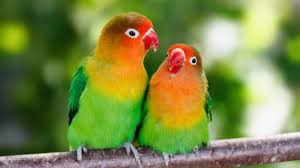
Lovebirds
Conditions of detention
Lovebirds require a spacious cage that allows for movement and play. The cage should have horizontal bars for climbing and be equipped with perches, toys, and a variety of enrichment activities. It’s important to place the cage in a well-lit area away from drafts and direct sunlight to provide a stable environment.
Useful Fact: Lovebirds are social creatures and thrive when housed in pairs, as they form strong bonds with each other. If kept alone, they require significant interaction with their human companions.
Nutrition and diet
A balanced diet for lovebirds includes high-quality pellets, fresh fruits, vegetables, seeds, and occasional nuts. Leafy greens, carrots, apples, and berries provide essential vitamins and nutrients.
Useful Fact: It’s important to offer a varied diet to prevent nutritional deficiencies, as a seed-only diet can lead to health problems in lovebirds.
Health
Lovebirds are generally healthy birds but can be prone to certain health issues such as respiratory infections, feather plucking, and obesity. Regular veterinary check-ups are crucial for maintaining their health.
Useful Fact: Monitoring their droppings can provide early signs of health issues; changes in color or consistency can indicate a problem.
Grooming and care
Lovebirds groom themselves by preening their feathers and enjoy occasional baths. Providing a shallow dish of water for bathing or misting them lightly with water can help maintain healthy feathers.
Useful Fact: Regularly trimming their nails and providing cuttlebone or mineral blocks can help keep their beaks and nails in good condition.
Education and training
Lovebirds are intelligent and can be trained to perform simple tricks and mimic sounds. Positive reinforcement and patience are key to successful training.
Useful Fact: Training sessions should be kept short (5-10 minutes) to maintain their interest and reinforce learning.
Toys and entertainment
Toys are essential for the mental stimulation and well-being of lovebirds. They enjoy a variety of toys, including swings, bells, and puzzles. It is important to rotate toys regularly to keep them engaged.
Useful Fact: Lovebirds enjoy toys that encourage chewing and manipulation, as these activities help keep them mentally stimulated and prevent boredom.
Safety
Safety considerations include ensuring that the cage is free of sharp edges and that the bar spacing is appropriate to prevent escape or injury. Keep them away from toxic substances, including certain household plants and fumes.
Useful Fact: Avoid using non-stick cookware around lovebirds, as the fumes can be toxic and even fatal to birds.
Accessories
Lovebirds require a variety of accessories for their cage, including perches, food and water dishes, and toys. Accessories should be made from safe materials like untreated wood or stainless steel.
Useful Fact: Natural wood perches help maintain foot health by varying the pressure points on their feet compared to uniformly shaped perches.
Socialization
Lovebirds are social creatures and thrive on interaction with humans and other birds. They should not be kept in isolation for extended periods.
Useful Fact: If you have a single lovebird, spending time with them daily is crucial for their mental health and well-being.
Travel and Transportation
When traveling with lovebirds, use a secure and well-ventilated travel cage. It’s important to keep the cage covered during transport to reduce stress.
Useful Fact: Familiarize your lovebird with the travel cage by placing it in their living space and allowing them to explore it before any trips.
Behavior and psychology
Lovebirds exhibit a range of behaviors and vocalizations that indicate their mood and health. Understanding these signals is essential for proper care.
Useful Fact: Lovebirds are known for their vocalizations and can become quite loud, especially when seeking attention or during play.
Legal aspects
In most areas, there are few legal restrictions on keeping lovebirds as pets, but it is important to ensure that any lovebirds purchased are from reputable breeders or pet stores, and not taken from the wild.
Useful Fact: Always check local regulations to ensure compliance with laws regarding pet ownership and breeding.


